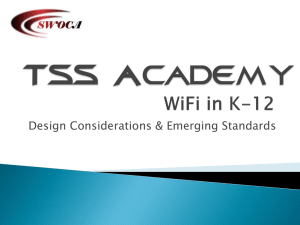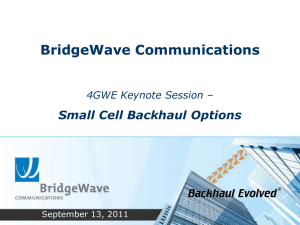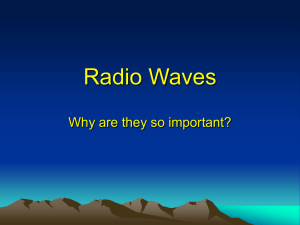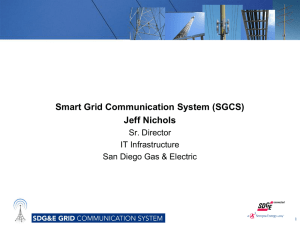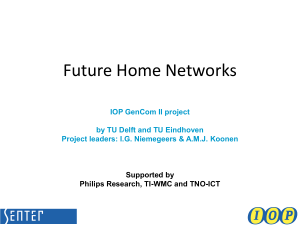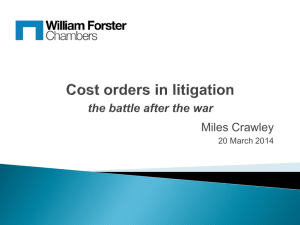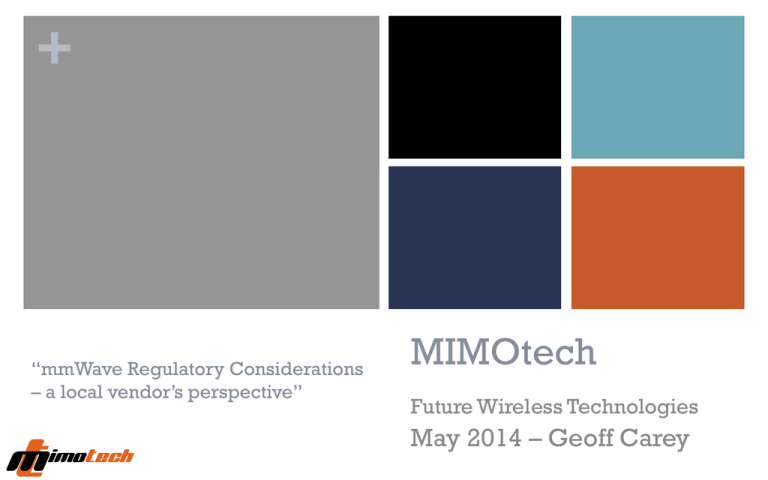
+
“mmWave Regulatory Considerations
– a local vendor’s perspective”
MIMOtech
Future Wireless Technologies
May 2014 – Geoff Carey
+
Overview
Wireless Backhaul
Challenges
The Advancement of WiGig
Devices
Throughput
Impact
Bandwidth
Co-existence?
Frequency
TDD versus FDD
Global Backhaul Trends
Below 40 GHz
mmWave
Regulatory Considerations
for mmWave
Suggested Focus Areas
Methodologies
© 2014 MIMOtech (Pty) Ltd. All rights reserved. Specifications subject to change without notice.
2015/04/13
Wireless Backhaul Challenges
Operators want more Mbps
(preferably Gbps) per link:
Sub-40 GHz mainly 28 MHz
mmWave offers >50 MHz
possibility
High Order QAM
Lower System Gain (Tx & Rx)
Shorter range
2500
Gross Throughput SISO (Mbps)
+
2000
1500
QPSK
16QAM
64QAM
256QAM
1000
1024QAM
Main Motivator for mmWave:
Opportunity to get to 10Gbps
using N x 50 MHz & N x 250 MHz
channels with XPIC / MIMO
2048QAM
500
0
28
50
56
125
250
Channel Bandwidth (MHz)
© 2014 MIMOtech (Pty) Ltd. All rights reserved. Specifications subject to change without notice.
2015/04/13
+
Wireless Backhaul Challenges (2)
Image courtesy of Aviat
© 2014 MIMOtech (Pty) Ltd. All rights reserved. Specifications subject to change without notice.
2015/04/13
+
TDD versus FDD – Vendor / User
TDD Allocations & Equipment
Advantages:
Suited to Asymmetric data
payloads (Ethernet IP)
Cost-effectiveness of
equipment (architecture)
Ease of freq planning
“Unlicensed” or “Light
licensed”
Disadvantages:
Lower throughput than FDD
FDD Allocations & Equipment
Advantages:
Low latency applications
Throughput higher than FDD
(BUT same spectral
efficiency).
Symmetric data and timing
applications (cellular
backhaul, framed data)
Disadvantages:
Strict freq planning required
“Carrier grade” pricing.
© 2014 MIMOtech (Pty) Ltd. All rights reserved. Specifications subject to change without notice.
2015/04/13
+
Global Backhaul Trends
Global Shipments of 7- 42 GHz
less in 2013 compared to 2012.
Demand for higher
throughputs
Frequency Congestion
mmWave growing
exponentially
Unlicensed (Note 1)
17 GHz total for 2013 only
24 GHz negative growth
© 2014 MIMOtech (Pty) Ltd. All rights reserved. Specifications subject to change without notice.
2015/04/13
+
Advancement of WiGig
Likely to be de facto
Wireless LAN (WiFi)
replacement
Estimated 1.5 Billion RF chip
devices @ 60 GHz (by 2018)
= lower cost of devices &
products
Becomes Ubiquitous:
Laptops will have it
(already in test)
Regulatory aspects MUST
be defined
Integrated nature of chip
device + antenna not likely
to allow much crossover
between indoor and
outdoor applications
Bandwidth, natural decay
and basic regulation should
allow indoor and outdoor
co-existence in the same
band (similar to 5.8 GHz)
© 2014 MIMOtech (Pty) Ltd. All rights reserved. Specifications subject to change without notice.
2015/04/13
+
Regulatory Considerations
Spectrum Efficiency & Fees
Early mmWave products caused
spectrum “pollution”. Need to
Regulate in ways that encourage
better use of Spectrum:
Specify minimum Spectral
Efficiency = bits/Hz
Annual Spectrum Fees:
Should be inversely
proportional to spectral
efficiency. New Factor required.
Fee should be between 1/10
and 1/5 of current fees. Create
a new FREQ factor for >30 GHz
= 0.005 or 0.01
Flexible Channel Allocations
Operators require necessary
flexibility to trade-off Link
Capacity versus distance.
Option for Channels to be
grouped in multiples:
N x 50 MHz @ 60 GHz
N x 125 MHz @ 70/80 GHz
Channel grouping allowed for
Operators/ISPs to manage
their own allocation/usage
© 2014 MIMOtech (Pty) Ltd. All rights reserved. Specifications subject to change without notice.
2015/04/13
+
Regulatory Considerations (2)
TDD versus FDD
Users have mixed
applications:
Allow both TDD and FDD
configurations in both VBand and E-Band
Allow Centre Gaps / Duplex
spacing to also be TDD
because of natural
attenuation.
Regulatory Regime
60 GHz = Unlicensed
Main motivation is the growth
of ubiquitous devices (WiGig).
70/80 GHz = Light licensed
High attenuation & directivity
will limit interference but
there needs to be control &
min spectral efficiency
criteria.
© 2014 MIMOtech (Pty) Ltd. All rights reserved. Specifications subject to change without notice.
2015/04/13
+
MIMOtech Wireless Backhaul
StarBurst Ultra High
Capacity
2x2 / 4x4 MIMO
StarLink High Capacity
Microwave
U6 to 23 GHz Licensed
17 / 24 GHz Unlicensed
mmWave
60 GHz
70 / 80 GHz
© 2014 MIMOtech (Pty) Ltd. All rights reserved. Specifications subject to change without notice.
2015/04/13
+
The Backhaul Space
© 2014 MIMOtech (Pty) Ltd. All rights reserved. Specifications subject to change without notice.
2015/04/13
+
Backhaul Application Matrix
Throughput
2 Gbps
1 Gbps
Janus 23/24G
StarLink
60/70/80G
StarLink Microwave
0.5km
1km
5km
10km
© 2014 MIMOtech (Pty) Ltd. All rights reserved. Specifications subject to change without notice.
Distance
(log scale)
2015/04/13


